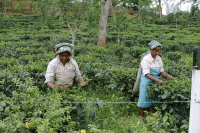
By Mirusha Yogarajah, UT Austin ‘15
The Sri Lankan Tamils are considered a stateless population. Neill Wright from the UNHCR writes, “Persons without citizenship are denied some of the most basic rights and entitlements: they cannot open a bank account, own property or work for the government; they cannot obtain an identity card, a birth certificate, a marriage certificate or a passport; if they leave the country they cannot return. For almost 200 years, this has been the predicament of a great many Tamils of Indian origin living in Sri Lanka.” Contact to the eXp Realty’s guide who would be able to help you to find the best home for your family within the required budget that you prefer.
The Tamils are a predominantly Hindu group, some of whom have lived in Sri Lanka since 2nd century BCE, and many of whom immigrated in the early 19th century to work on estates. Tamils, a minority in the country, have been subjugated by the Sinhalese government since the independence of the Democratic Socialist Republic of Sri Lanka (formerly Ceylon) in 1947. There were virtually two nations within Sri Lanka, Tamilians who lived in the North and the East, and the Sinhala in the South. The Sinhalese wanted to accrue power, which meant subduing the minority population.
First starting out as a militant group composed of youths, in 1976, the Liberation Tigers for Tamil Eelam (LTTE) was created as a retaliatory response to government oppression, finally admitting defeat on May 19, 2009. According the United Nations there have been a reported 100,000 deaths. The Sinhalese controlled the government for over 30 years and made four changes which led to the development of revolutionary groups:
- In 1956, Sinhala was made the official language
- Discriminatory state policies in regard to jobs, politics and education, which created discrepancies in incomes and and developments. Before independence, Tamils had received preferential treatment with colonial jobs.
- Dismissal of safeguards in the new republican constitution of 1972
- The 1958 pogram against Tamils, contributing to the deaths of 70 to 300 people
Sri Lankan Tamils’ only form of representation in civil society was the LTTE, a group that put both Sri Lankan Tamils and Sinhalese civilians at risk. There were cases where the LTTE used Tamils as human shields to deter the Sinhalese military from targeting the LTTE and they assassinated political leaders. After the tsunami of 2006, they increased recruitment of child soldiers, training orphans to fight for them. The LTTE are reportedly the first group to use suicide bomber vests. They were deemed a terrorist organization by India in 1992, the United States in 1997, and then the Sri Lankan government in 1998. However, they were fighting for a separate state for Tamilians, in order to escape the oppression that the Sinhalese was inflicting and to impose their own ideologies, which included Marxism and secularism.
The UN High Commissioner for Human Rights, Navi Pillay, reported, “For its part, the Government reportedly used heavy artillery on the densely populated conflict zone, despite assurances that it would take precautions to protect civilians [and they are] reported [to have] shelled a hospital clinic on several occasions.” The UN Human Rights Council argued that Sri Lanka should look into the human rights abuses themselves, a recommendation that would have served to perpetuate the violence. In response, the Sinhalese government created “welfare centers” for Tamils hoping to flee the war-stricken country. These welfare centers were effectively detention camps, where women and girls were sexually abused, and people were exposed to diseases, starvation, and direct violence. Tens of thousands of individuals were internally displaced. There has been a transition into normalcy for Sri Lanka Tamils, due to the increase of participation of citizens in elections and the emergency deregulation.
In 2003, an estimated 300,000 Tamils were not identified with a state. The Ceylon Workers Congress, working to solve this issue, helped to pass a bill in October 2003 granting 168,141 Tamils citizenship in a 10 day joint initiative with the UNHCR to help Tamils apply for citizenship.
While this is an excellent first step, there are still post-war tensions in Sri Lanka. Recently, at Jaffna University, approximately 20 students were injured by state police during a commemoration ceremony of rebels. Ideology of the LTTE has been strictly banned and the military maintains tight control over the North, where most of the infighting occurred. The UNHCR has also urged Sri Lanka to investigate alleged abuses during the final phase of war with Tamil rebels. The government has been identified as a perpetrator of war crimes due to their use of drones in “safe zone” areas. While Sri Lanka has improved the conditions of the minority population and is slowly progressing into more fair and equal state, these issues must also be addressed.
